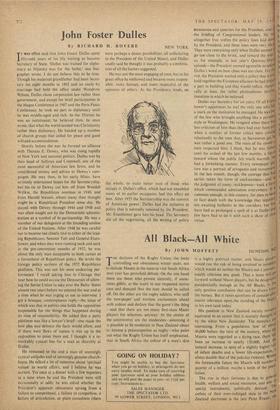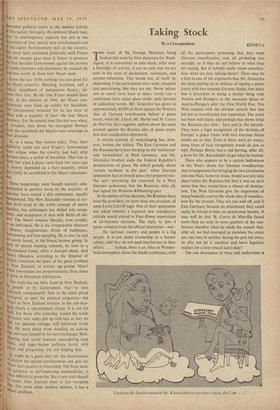All Black All White
By JOHN
TFIE decision of the Rugby Union, the body controlling our obsessional winter sport, not to include Maoris in the team to visit South Afrjca next year has provoked debate. On the one hand there are those who .protest sincerely, if some- times glibly, at the insult to our respected native race and demand that the tour should be called off. On the other are the rugby addicts, who sniff the newspaper and wireless excitements ahead with ardour and declare that the game's the thing --and that there are not many first-class Maori players for selection, anyway. At the centre of the controversy are the moderates—assuming it is possible to be moderate in New Zealand about S(.' intense a preoccupation as rugby—who point out what the Rugby Union has itself emphasised, that in South Africa the colour of a man's skin is a highly political matter, and Maori plaYers would run the risk of being involved in incideots which would do neither the Maoris nor Common- wealth relations any good. That a team will g°A forward without Maori players, but be designate' paradoxically enough as the All Blacks, is the only positive conclusion that can be drawn froi° the barney. But it raises questions of considerablY, nearer relevance upon„the standing of the Nla°r1 in his own land today. His position in New Zealand society rcirial equivocal to an extent that is scarcely thought by the white New Zealander. The statistics arei interesting. From a population 'low' of ab°11 40,000 before the turn of the century, when the Maoris were regarded as a dying race, there 11° been an increase to nearly 150,000. And the natural increase, in spite of a slightly higher rni!, of infant deaths and a lower life-expectati0n. about double that of the pakehas (whites). Within the foreseeable future the Maoris will number ! quarter of a million, maybe a tenth of the 1,0147 lation.
The rise in their fortunes is due to ge
ne al health, welfare and social measures, and also 1‘.. special instruments, politically devised. Th:, author of their over-indulged state in the I%ie Zealand electorate is the late Peter Fraser, th shrewdest political realist in the modern history or this nation. Strangely, the depleted Maori race, Poor in contemporary capacity but rich in the 1)o.session of four special area constituencies out of the eighty Parliamentary seats in the country, bad never been evaluated politically until Fraser bent his myopic gaze upon it. Intent to preserve the first Socialist Government against the erosion 01 public boredom and discontent, he realised the supreme worth of those four Maori seats.
From the late 1930s nothing was too good for the Maori minority. Housing, handouts, and a treacly cloudburst of inexpensive flattery, be- vtime their fare. By the time Fraser needed them host, in the election of 1946, the Maori con- ttituencies were lined up solidly for Socialism. the Government returned for its last term of °Mee with a majority of four—the four Maori Itleinbers. For the second time (the first was when, ks invader's, they drove the aboriginal Moriori trom the mainland) the Maoris were sovereign in New Zealand.
So, in a sense, they remain today. True, their solidarity could not save Fraser's Government from eclipse when the country had had, after thirteen years, a surfeit of Socialism. That was in 1948; but when Labour came back two years ago ik victory depended on a bare majority, which nizty fairly be accredited to the Maori constituen- ties.
These happenings, even though scarcely com- prehended in positive terms by the majority of Pakehas, have caused a dim resentment, equally Unexpressed. The New Zealander remains at sur- face level loyal to the noble concept of native ktuality, but enthusiasm has dulled into accep- lance, and acceptance is shot with flecks of dis- tent, The Maori remains likeable, even lovable, an individual. He is the irresponsible itinerant 'shearer, slaughterman, driver of bulldozers, last-earning and free-spending. He is also, he and his lavish brood, in the lowest inc6me group. In 1P1le of special housing schemes, he lives in a lb-standard house, 'often a decrepit shack. And ?`laori offenders, according to the Minister of Justice, constitute the heart of the penal problem io New Zealand; in certain age-groups Maori 'rime convictions are proportiorfately three times Os great as European convictions.
The truth has not been faced in New Zealand, bY people or by Government, that—in turn e\Ploited, compensated, then in the latest phase ()rt.upted, to meet the political exigencies—the \laori in New Zealand remains in his sub-stan- (1,ard shanty a sub-standard citizen. It is not his 'milt, but those who yesterday lauded his noble 1.1aracter, who today put up with him as they do ‘Nh!th our debased coinage, will tomorrow revile t till. He must desist from standing on pakeha ()es and raise himself by his own bootstraps. Well- taning state social workers, squandering state "Inds, and eager-beaver politicos lavish with Praise and perquisites, are not helping him.
it might be a good start for the Government abolish the special constituencies and give the i'.1aori real equality in citizenship. The basic need, ne guidance to self-respecting responsibility, is !uore difficult to prescribe. But a new start should made. New Zealand must at. last recognise kit, like some other modern nations, it has a tolour problem.















































 Previous page
Previous page